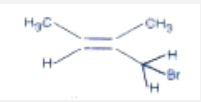Why is methyl chloride hydrolysed more readily than chlorobenzene?
To answer the question of why methyl chloride hydrolyzes more readily than chlorobenzene, we will analyze the structures and bonding characteristics of both compounds.
1. Identify the Structures:
- Methyl chloride (CH₃Cl) consists of a methyl group (CH₃) bonded to a chlorine atom (Cl).
- Chlorobenzene (C₆H₅Cl) consists of a benzene ring (C₆H₅) with a chlorine atom attached.
2. Understand Hydrolysis:
- Hydrolysis refers to the reaction of a compound with water, resulting in the formation of an alcohol. For methyl chloride, hydrolysis produces methanol (CH₃OH). For chlorobenzene, hydrolysis would ideally produce phenol (C₆H₅OH).
3. Bond Character Analysis:
- In methyl chloride, the carbon-chlorine (C-Cl) bond is primarily a single bond. This single bond is relatively weak and allows for easier cleavage during hydrolysis.
- In chlorobenzene, the C-Cl bond exhibits partial double bond character due to resonance. The chlorine atom has lone pairs that can participate in resonance with the benzene ring, leading to a stabilization of the C-Cl bond.
4. Resonance in Chlorobenzene:
- The resonance structures of chlorobenzene show that the C-Cl bond can be represented as having some double bond character. This means the bond is stronger and less reactive compared to the C-Cl bond in methyl chloride.
- The presence of resonance structures means that the bond is not just a simple single bond, but rather has characteristics that make it more stable and less likely to react.
5. Reactivity and Hydrolysis:
- Due to the weaker C-Cl bond in methyl chloride, it is more susceptible to hydrolysis. The bond can easily break when methyl chloride is treated with water, leading to the formation of methanol.
- Conversely, the stronger C-Cl bond in chlorobenzene, due to its partial double bond character, makes it less reactive. As a result, chlorobenzene does not readily undergo hydrolysis to form phenol.
6. Conclusion:
- Methyl chloride hydrolyzes more readily than chlorobenzene because it has a weaker C-Cl bond (single bond character) compared to the stronger C-Cl bond in chlorobenzene (partial double bond character due to resonance). This makes methyl chloride more reactive and capable of undergoing hydrolysis.
- Methyl chloride (CH₃Cl) consists of a methyl group (CH₃) bonded to a chlorine atom (Cl).
- Chlorobenzene (C₆H₅Cl) consists of a benzene ring (C₆H₅) with a chlorine atom attached.
- Hydrolysis refers to the reaction of a compound with water, resulting in the formation of an alcohol. For methyl chloride, hydrolysis produces methanol (CH₃OH). For chlorobenzene, hydrolysis would ideally produce phenol (C₆H₅OH).
- In methyl chloride, the carbon-chlorine (C-Cl) bond is primarily a single bond. This single bond is relatively weak and allows for easier cleavage during hydrolysis.
- In chlorobenzene, the C-Cl bond exhibits partial double bond character due to resonance. The chlorine atom has lone pairs that can participate in resonance with the benzene ring, leading to a stabilization of the C-Cl bond.
- The resonance structures of chlorobenzene show that the C-Cl bond can be represented as having some double bond character. This means the bond is stronger and less reactive compared to the C-Cl bond in methyl chloride.
- The presence of resonance structures means that the bond is not just a simple single bond, but rather has characteristics that make it more stable and less likely to react.
- Due to the weaker C-Cl bond in methyl chloride, it is more susceptible to hydrolysis. The bond can easily break when methyl chloride is treated with water, leading to the formation of methanol.
- Conversely, the stronger C-Cl bond in chlorobenzene, due to its partial double bond character, makes it less reactive. As a result, chlorobenzene does not readily undergo hydrolysis to form phenol.
- Methyl chloride hydrolyzes more readily than chlorobenzene because it has a weaker C-Cl bond (single bond character) compared to the stronger C-Cl bond in chlorobenzene (partial double bond character due to resonance). This makes methyl chloride more reactive and capable of undergoing hydrolysis.
Topper's Solved these Questions
- HALOALKANES AND HALOARENES BOOK - ICSECHAPTER - HALOALKANES AND HALOARENES EXERCISE - EXERCISE (PART - II DESCRIPTIVE QUESTIONS) (LONG ANSWER QUESTIONS)
65 Videos
- HALOALKANES AND HALOARENES BOOK - ICSECHAPTER - HALOALKANES AND HALOARENES EXERCISE - ISC EXAMINATION QUESTIONS
4 Videos
- HALOALKANES AND HALOARENES BOOK - ICSECHAPTER - HALOALKANES AND HALOARENES EXERCISE - EXERCISE (PART - II DESCRIPTIVE QUESTIONS) (VERY SHORT ANSWER QUESTIONS)
83 Videos
- GENERAL PRINCIPLES AND PROCESSES OF ISOLATION OF ELEMENTS BOOK - ICSECHAPTER - GENERAL PRINCIPLES AND PROCESSES OF ISOLATION OF ELEMENTS EXERCISE - EXERCISE (PART-I ( OBJECTIVE QUESTIONS )) (Fill in the blanks)
60 Videos
- ISC QUESTION PAPERBOOK - ICSECHAPTER - ISC QUESTION PAPEREXERCISE - PART-II(SECTION-B)
74 Videos
Similar Questions
How will you convert ethyl bromide into ethane.
View SolutionHow can the following conversion be brought about?
Chlorobenzene to phenol.
View SolutionWrite the IUPAC name of compound.

View SolutionFill in the blanks choosing appropriate word/ words from those given in the brackets : (gravity separation, magnetic separation, absence, presence, CuFeS2, Cu2S, froth flotation, aluminium, iron, smelting, pure, impure, mines, copper, silver, sulfide, zinc, chromium nickel, tin, blister copper, Cus, Fes, thermal, electrical, argentite or silver glance (Ag2S), cuprous oxide, cuprous sulfide.)
Sulfide ores are concentrated by ............. process.
View SolutionWrite the formula of the following compounds :
Potassium trioxalatoaluminate (III).
View SolutionExplain why benzamide is less readily hydrolysed than methyl Benzoate.
View SolutionAllyl chloride is hydrolysed more readily than n-propyl chloride. Why ?
View SolutionOut of chlorobenzene and chloroethane which is more readily hydrolysed with aqueous KOH?
View SolutionAllyl chloride is hydrlysed more readily than n-propyl chloride. Why?
View Solutionकारण स्पष्ट कीजिये-
मेथिल क्लोराइड का क्लोरीन परमाणु क्लोरोबेंजीन के क्लोरीन परमाणु से अधिक क्रियाशील है।
View SolutionAllyl chloride is hydrolysed more readily than n-propyl chloride. Why?
View Solutionक्लोरोबेंजीन की अपेक्षा मेथिल क्लोराइड में C−CI आबंध-
View Solutionक्लोरोबेन्जिन की अपेक्षा मेथिल क्लोराइड में C−CI आबंध-
View SolutionAllyl chloride is hydrolysed more readily than n-propyl chloride.
View SolutionAllyl chloride is hydrolysed more readily than n-propyl chloride. Why?
View Solution
